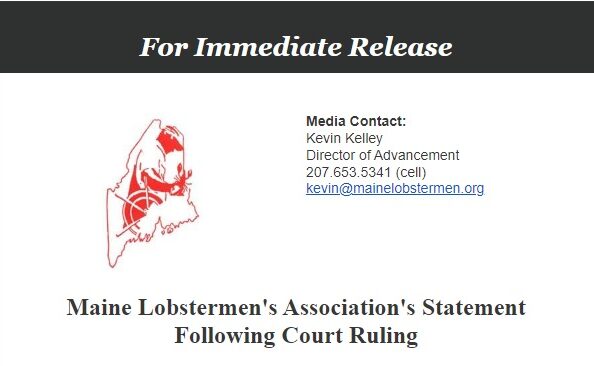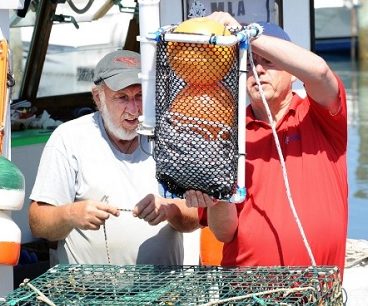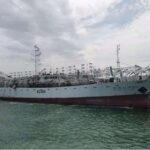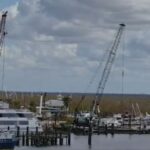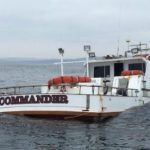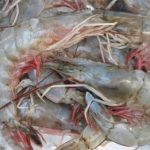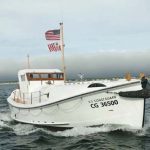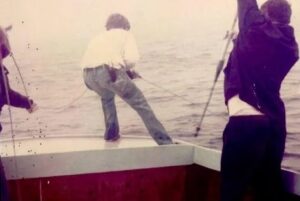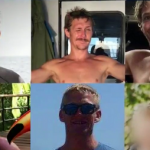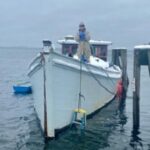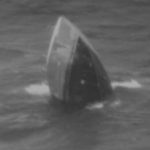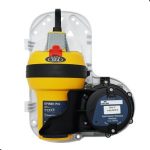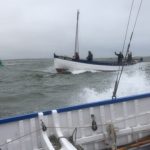Search Results for: center for biological diversity
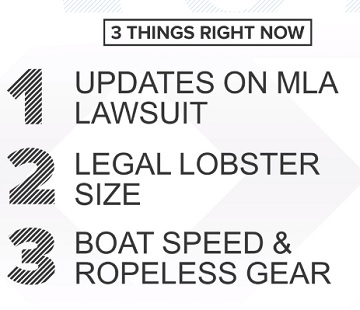
Annual fisheries meeting tackles lobster lawsuits, whale protections
Tuesday in Washington D.C., key players from Maine’s lobster fishery tackled what it considers its most pressing issues. The first issue was an update regarding Judge James Boasberg’s July ruling in the U.S. District Court case involving the Center for Biological Diversity versus Secretary Raimondo and the Maine Lobstermen’s Association. This case made the news in early July after Boasberg ruled regulators aren’t doing enough to protect the right whale. Just days after, he sided with environmental groups in another lawsuit to allow Area 1 to close again to fishermen this coming fall and winter. Another issue was a proposal to shrink the size limit for lobsters over the course of five years in order to replenish the declining population of young lobsters. Also, reduced boat speeds and the future of ropeless lobster traps. >click to read< 20:15

Statement from Maine Lobstermen’s Association on Court Ruling
Below is a statement from the Maine Lobstermen’s Association following today’s decision in a lawsuit filed by the Center for Biological Diversity. The Maine Lobstermen’s Association (MLA) will not allow this industry to go down without a fight. Today’s ruling from the U.S. District Court for District of Columbia is a mixed bag but clearly demonstrates why it’s more important than ever for MLA to have the financial resources to continue this battle. >click to continue< 21:01
Statement from Maine Lobstermen’s Association on Court Ruling
KENNEBUNK – Below is a statement from the Maine Lobstermen’s Association following today’s decision in a lawsuit filed by the Center for Biological Diversity.
The Maine Lobstermen’s Association (MLA) will not allow this industry to go down without a fight. Today’s ruling from the U.S. District Court for District of Columbia is a mixed bag but clearly demonstrates why it’s more important than ever for MLA to have the financial resources to continue this battle.
The court granted two of the plaintiffs’ six claims, ruling that certain aspects of the 2021 Biological Opinion (BiOp) and 2021 Final Whale Rule are invalid. However, the court has not shut down the fishery or decided on a remedy yet. As the Court stated, “[t]he Court’s findings at this juncture do not dictate that it must immediately shutter the American lobster fishery; indeed, it is cognizant of what a weighty blow that would inflict.” Instead, the Court has requested the parties to submit additional briefing about what remedy should be ordered by the Court.
The Court also acknowledged that, after further review, the agency may find “that projected take [of endangered whales] is in fact lower than originally estimated.” This is precisely why MLA filed its own lawsuit against NMFS, which remains pending. MLA’s case demonstrates that the government’s order for a 98% reduction in the lobster fishery’s minimal risk to right whales rests solely on hypothetical, inflated estimates unsupported by the agency’s own data. These are issues that MLA believes the court must direct the agency to examine rigorously.
Patrice McCarron, Executive Director of the Maine Lobstermen’s Association, states, “We are still reviewing the Court’s opinion with our lawyers, but we are heartened that the Court recognizes the great importance of Maine’s lobstering heritage and appreciates the potential and unnecessary harm that could be imposed on the men and women who work so hard to make our industry thrive.”

New Right Whale Endangered Species Condom Distributed for World Ocean Day
The Center for Biological Diversity will head to Capitol Hill on Wednesday, June 8 to distribute endangered species condoms in honor of World Ocean Day and mark the 50th anniversary of the Marine Mammal Protection Act. Center staff will hand out newly designed right whale condom packages with the slogan “Cover your spout… don’t let the right whale die out.” The new right whale design is part of the Center’s Endangered Species Condoms campaign, which draws attention to how human population growth is affecting critically endangered species. >click to read< 10:55

Maine lobster industry fights lawsuit that aims to shut down fishery
While Maine’s lobster industry has been fighting an offensive legal battle against impending rules to protect endangered North Atlantic right whales, it also is playing defense in a case brought by environmentalists that seeks to shut down the lobster fishery entirely. Lobster industry groups are intervening in a case brought in Washington, D.C.’s U.S. District Court by the Center for Biological Diversity and other plaintiffs that argues the new federal restrictions aren’t adequate, and that the fishery’s continued operation poses an existential threat to the whales. >click to read< 19:15
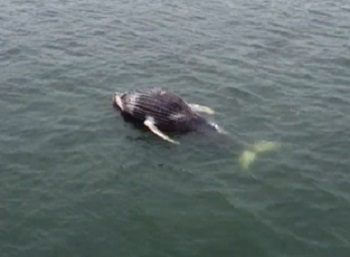
COVID-19 saves right whales by sinking cruise ships
Canada created the Shediac ship restricted zone in April 2020 just a couple weeks before Holland America’s Zaandam was scheduled to sail through that zone on a shipping lane used only seasonally by cruise ships as a shortcut to Quebec City. However, a COVID-19 no-sail order in March 2020 superseded that restriction. Consequently, there was not one Canadian ship right whale strike death in two years and only one Canadian crab entanglement death,,, Zero whales were killed by lobster gear. There has not been one death from lobster gear in the U.S. and only a couple in Canada in over 20 years but the Center for Biological Diversity, with no supporting data, claims the whales are going extinct based on lobster entanglements. >click to read< By Jim O’Connell 07:31
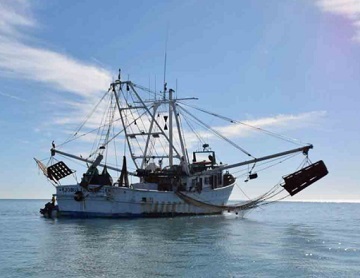
U.S. puts restrictions on Mexican boats over illegal fishing
The U.S. government is putting restrictions on Mexican fishing boats entering U.S. ports over allegations that the Mexican government has failed to prevent illegal fishing in U.S. waters. Starting Feb. 7, all Mexican fishing boats in the Gulf of Mexico will be prohibited from entering U.S. ports. “This is an example of how rampant illegal fishing is in Mexico,” said Alejandro Olivera with the Center for Biological Diversity. “Mexican fisheries enforcement has been weakened since the start of this administration.” >click to read< 09:50

Lawsuit filed to Protect Pacific Humpback from fishing gear, Can lawsuits save North Atlantic Right Whale?
The Center for Biological Diversity sued the National Marine Fisheries Service today for failing to protect endangered Pacific humpback whales from deadly entanglements in sablefish pot gear off the coasts of California, Oregon and Washington. According to Fisheries Service estimates, the sablefish fishery on average kills or seriously injures about two humpback whales every year. The fishery uses 2-mile-long strings of 30 to 50 pots. >click to read< Can Litigation Help Save the North Atlantic Right Whale From Extinction? – As conservation organizations and governments around the globe grapple with the devastating effects of climate change and overexploitation, the legal battle fought over the critically endangered North Atlantic right whale, one of the world’s most endangered large whale species, may provide insights into how litigation can help, or hinder, efforts to save species from extinction. >click to read< 13:41

National: Legal Petition Seeks Federal Ropeless Rule to Save Whales, Turtles From Fishing Gear
The Center for Biological Diversity formally petitioned the National Marine Fisheries Service to require crab, lobster and other trap fisheries to convert to new ropeless or “pop-up” gear within the next five years. The petition requests that the agency prioritize the transition in national marine sanctuaries.,, The proposed change would protect whales and other animals from entanglements in California’s Dungeness crab fishery, New England’s lobster fishery, the stone crab fishery in the Gulf of Mexico, and others. >click to read< 07:17

Feds, con groups file appeal to reinstate seasonal lobstering ban
In their appeal, the federal government and the conservation groups, the Center for Biological Diversity, the Conservation Law Foundation and the Defenders of Wildlife, argue that not only did the National Marine Fisheries Service use the best available science, but also that the lobstering groups did not present any actual evidence of the “certain economic harms” the judge referenced. Also in the appeal, the groups claim that the plaintiffs’ criticism of the availability and quality of data to support the restrictions is misplaced. The fisheries service admitted that more data would be beneficial to refine the agency’s understanding of right whale distribution, but it argued that the data already available is sufficient. >click to read< 08:02

Mills Administration Granted Intervenor Status to Support Maine’s Lobster Industry in Lawsuit
Governor Janet Mills announced today that a federal judge has granted her Administration’s motion to intervene in the pending litigation Center for Biological Diversity v. Ross in the U.S. District Court in the D.C. Circuit. “Intervening in this case is a critically important step in the state’s efforts to support Maine’s vital lobster industry,” said Governor Mills. “A court decision in the plaintiff’s favor could close Maine’s lobster fishery altogether – a completely unacceptable outcome that would be devastating to our lobstermen and their families and devastating to our coastal communities and our economy. We will fight tooth and nail to prevent that from happening.” >click to read< 07:09
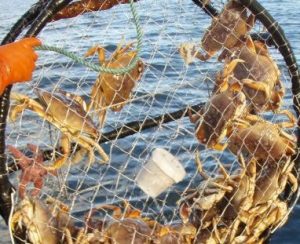
California: New regulations shut down Commercial Dungeness Crab season early
After a particularly hard start to the season, commercial Dungeness crab fisheries closed several weeks early on June 1. June 7 marked the start of the Lost and Abandoned Gear Program, which incentivizes retrieving and turning in leftover fishing gear. Both the closure and the gear removal program aim to protect migrating humpback whales and other marine life from getting tangled in fishing equipment. The Center for Biological Diversity sued the California Department of Fish and Wildlife (CDFW) after a fishing season with 71 whale entanglements in 2016. New regulations imposed after the settlement allow officials to shut down the season when the risk of whale or leatherback sea turtle entanglements is high. >click to read< 17:37
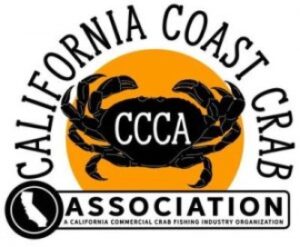
Misguided AB 534 ‘Pop-Up Crab Gear’ Will Hurt Whales, Fishing Families, Coastal Communities
Data Show Whale Populations Soaring, Virtually No Interactions with Crab Gear! Recently, Assembly Member Bonta of the California Legislature introduced a bill, AB 534 that if passed, would require faulty and failure prone ropeless fishing gear, as determined by the California Department of Fish and Wildlife (CDFW), to be used when taking any species of fish for commercial or recreational purposes when using a trap. AB 534 promotes an unproven and unviable fishing method that presents significant operational and safety risks to West Coast fisheries and that will result in more harm to marine life. The bill is an end-run around existing state and federal regulatory >click to read< 13:32
 Bill 534 could eliminate whale entanglements, hurt (destroy) the crab fishery – 03/4/2021, Authored by Rob Bonta-D California, in collaboration with Social Compassion in Legislation and the Center for Biological Diversity, Assembly Bill 534 argues that crabbers use antiquated trapping gear >click to read<
Bill 534 could eliminate whale entanglements, hurt (destroy) the crab fishery – 03/4/2021, Authored by Rob Bonta-D California, in collaboration with Social Compassion in Legislation and the Center for Biological Diversity, Assembly Bill 534 argues that crabbers use antiquated trapping gear >click to read<
Misguided AB 534 ‘Pop-Up Crab Gear’ Will Hurt Whales, Fishing Families, Coastal Communities
For Immediate Release March 30, 2021
Misguided AB 534 ‘Pop-Up Crab Gear’ Will Hurt Whales, Fishing Families, Coastal Communities
Data Show Whale Populations Soaring, Virtually No Interactions with Crab Gear Crescent City, CA – Recently, Assembly Member Bonta of the California Legislature introduced a bill – AB 534 – that, if passed, would require faulty and failure prone ropeless fishing gear, as determined by the California Department of Fish and Wildlife (CDFW), to be used when taking any species of fish for commercial or recreational purposes when using a trap.
That’s why a large, diverse coalition of fishery groups have mobilized in recent weeks to oppose AB 534. A letter signed by all the major fishing and seafood processing trade associations has been sent to Assembly Member Bonta and the Water and Parks Committee members who will vote on the legislation. A petition opposing the bill is being circulated widely on social media fishing pages and already has over 4,000 signatures.
AB 534 promotes an unproven and unviable fishing method that presents significant operational and safety risks to West Coast fisheries and that will result in more harm to marine life. The bill is an end-run around existing state and federal regulatory processes that are already addressing fishery interactions with humpback whales,” said Ben Platt, President of the California Coast Crab Association (CCCA).
“The commercial crab industry has worked tirelessly for more than a decade to mitigate interactions between our fishery and Endangered Species Act (ESA) listed animals, including Humpback whales, Blue whales, and Leatherback turtles. These measures have reduced marine mammal interactions with fishing gear to practically zero,” continued Platt. “While the optics of extremely rare interactions with existing crab gear are upsetting, the real danger to a robust and rapidly growing whale population is the so-called ‘ropeless’ gear being proposed by AB 534.That’s because as much as 20
percent of this gear is lost or irretrievable, which litters the ocean and greatly increases, NOT decreases, the risk of entanglement for whales and turtles.”
The proposed bill is more restrictive than even the most protective marine mammal laws in the nation, the Marine Mammal Protection Act (MMPA) and the ESA. It would require the state to unnecessarily regulate commercial fishing, taking an end run around the regulatory process by mandating through statute an unworkable new technology which has zero support in the fisheries.
Humpback whales, the only ESA-listed marine mammal which has any potential co-occurrence with the crab fishery, are a robust and thriving population. The only significant non-naturally occurring mortality to whales off the CA coast is caused by large ship strikes. These cruise and cargo ships kill between 50-150 whales a year, yet the Humpback whale population is still expanding at a rate of 8-10 percent annually, according to the Cascadia Research Collective (CRC). That means 575 new animals will be added to the population just this year.
“When the Center for Biological Diversity first sued CDFW in 2018 over the interaction issue, there were thought to be 2,200 Humpback whales, but recent official revisions to the population count shows more than 7,200 migrating off the West Coast,” said Platt.
“The California Dungeness crab fishery has had zero confirmed interactions with Humpbacks in the current 2021 season, and only one confirmed interaction with a whale during the 2020 season, and that whale was released unharmed. Our fishery has zero impact on the species, and in fact, we are hopeful Humpbacks will soon be removed from the Endangered Species List.
“This is a huge success story, and in light of it, AB 534 constitutes a solution in the absence of any problem,” continued Platt. “And because the crab fishery is our most widely shared and economically important fishery, the new bill threatens the continuation of the entire West Coast commercial fishing industry. Most fishermen and seafood buyers will not be able to stay in business without a viable crab season. The long-term effects on the rural coastal communities of California, which rely heavily on the crab industry, will be devastating.”
“I’ve been buying and selling live crabs for more than a decade, including year-round delivery to many Asian restaurants and seafood markets in Assembly Member Bonta’s own district, and I can tell you his bill will make it extremely challenging for all of us to survive economically,” said George Lay, owner of Ocean King Fish. “The Asian community is all about traditions, especially live Dungeness crab; it’s at every family gathering. AB 534 will price live crab out of reach for a lot of families, essentially killing this tradition and many businesses in the process.”
Further, the cost for the three ropeless gear types being most aggressively pushed range between $720 and $2,500 per device. This means that a permit owner with a 500-trap tier allotment must spend between $360,000 and $1,255,000 to switch from the existing gear to “pop-up” gear. By comparison, a 500-trap allotment today, including all traps, lines, buoys, and bait jars, will cost between $80,000 and $125,000.
“Even the most successful crab boat owners will not be able to afford to switch to ‘pop- up’ traps,” said Pratt. “This is a total non-starter for this fishery, and crabbers are not interested in wasting time and money on a gear type that won’t work and will bankrupt them.”
For further evidence that AB 534 is unneeded – and indeed dangerous – the successful rules and practices developed over the past decade were in partnership with Director Bonham and the CDFW, Chairman Crowfoot and the Ocean Protection Council, Senator Mike McGuire and his Joint Committee in Fisheries and Aquaculture, and stakeholder groups including the Dungeness Crab Task Force, the Whale Working Group, the California Coast Crab Association and other stakeholders.
These measures include strict trap limits which "cap" the number of traps which can be deployed in the fishery; a Whale Working Group to assess risk and recommend in- season management measures to avoid interactions with the fishery; an enforceable Safe Practice Guideline for crab gear; a coastwide, enforceable Lost Gear Retrieval Program; and, most recently, a CCCA boat-based whale surveying pilot project to help reduce cost and manpower burden on CDFW, while increasing coverage of critical marine life concentration reporting to avoid co-occurrence with the fishery.
“Unfortunately, California regulators so far have not been willing to change the regulations to reflect the higher whale population numbers or push back seriously against the NGO attacks on our coastal fishing communities. The only gear type they have seriously considered is ‘pop-up’ gear, which has proven to be extremely cost prohibitive, impractical, and ineffective, and results in more risk to marine mammals, not less,” said Platt.
“There is already an existing process underway under Section 10 of the ESA to implement a Conservation Plan to protect ESA-listed species along California’s coast. That plan will also comply with the MMPA. The ESA and the MMPA are the ‘gold standard’ for the protection of marine mammals. It is not helpful—and not protective for marine mammals—for the state to have to deal with unnecessary and ill-advised distractions from completing those federal processes,” said Ryan Steen, attorney with Stoel Rives LLP who represents CCCA and specializes in the ESA and MMPA.
About the California Coast Crab Association
The CCCA is a non-profit 501(c)(6) trade organization composed of individual crab boat owners, hired captains and Dungeness crab buyers. The CCCA board of directors is made up of nine member fishermen and crab buyers with a combined 240 years of experience in the crab fishery. Our diverse membership includes the smallest operators with skiffs up to the largest crab boats on the West Coast, and our member-buyers range from small live crab peddlers to the largest distributor of seafood on the West Coast.
The CCCA was formed in May of 2019 after the disastrous out-of-court settlement agreement in CBD vs Bonham, which created new, highly restrictive, and unfair restrictions for the California Dungeness crab fishery. Dungeness crab is the most widely shared and economically important fishery to the West Coast commercial fishing industry, but the new ESA mandates created by CBD vs Bonham are threatening the viability of the fishery and the economic health of California's coastal communities.
Since formation, the CCCA has been working hard with the crab fishing industry and the CDFW to find workable solutions to meet the mutually shared goals of protecting our most valuable fishery and minimizing interaction between marine mammals and our
fishing gear. In recent years, the commercial fishing fleet has been proactive in addressing important issues by initiating legislation through our Dungeness Crab Task Force to create new rules, including tiered trap limits, a Whale Entanglement Working Group, a statewide Lost Gear Retrieval Program and Safe Practice Guidelines for fishermen. More information at www.cacoastcrabassociation.org.
Media Contacts:
Ray Young
Razor Sharp PR
916-505-4245
[email protected]
Ben Platt
President, CCCA
707-367-0385
[email protected]
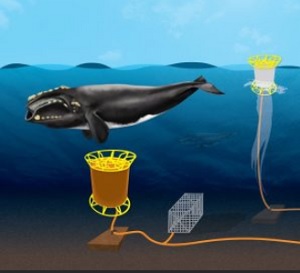
Emergency Petition! Awaiting Court-Ordered Help, Enviro’s Want Ban on Some Lobster Traps, pushing newer ropeless traps
“We filed this petition because it is an emergency situation,” Kristen Monsell, oceans legal director at the Center for Biological Diversity,,, Monsell and colleagues brought a lawsuit against the federal government in 2018, challenging how it has managed lobster fishing and arguing for better right whale protections. In April, U.S. District Judge James Boasberg ordered the National Marine Fisheries Service to issue new regulations by the end of May of 2021. In the interim, the petitioners say it’s necessary to ban vertical lines. That could happen without banning lobster fishing outright, since newer, ropeless traps don’t pose the same risks to the whales. >click to read< 07:12
Emergency Petition Seeks to Protect Endangered North Atlantic Right Whales From Fishing Gear – >click to read<
Today, the Humane Society of the United States and Humane Society Legislative Fund, along with our coalition partners,,, >click to read<
Extended Closure of CA Dungeness Crab Fishing Season Will Hurt Working Families, Eliminate Holiday Crab Traditions
For Immediate Release
November 24, 2020
Crescent City, CA – The California Department of Fish and Wildlife (CDFW) today delayed the state’s commercial Dungeness crab fishing season an additional two weeks until at least Dec. 16 due to the continuing presence of whales.
“Since mid-November, fishermen have had to sit idle at the dock and accept delays in the opening of their crab season due to the new, highly restrictive and unfair RAMP rules. “And now the season is being postponed for a full month,” said Ben Platt, president of the California Coast Crab Association (CCCA). “We have basically been forced to accept these delays because according to the new rules, we risk losing the entire season if even one or two whales interact with crab lines. Meanwhile, Californians are being denied access to fresh, delicious holiday crab.”
Called the Risk Assessment Mitigation Program (RAMP), the new CDFW rules are more restrictive than even the strictest fishery laws in the nation, the Marine Life Protection Act (MLPA) and the Endangered Species Act (ESA).
But Humpback whales, the only ESA listed marine mammal which has any potential co-occurrence with the crab fishery, are a robust and thriving population. The only significant non- naturally occurring mortality to whales off the CA coast is caused by large ship strikes. These cruise and cargo ships kill between 50-150 whales a year, yet humpback whale population is still expanding at a rate of 7.5 percent annually, according to the Cascadia Research Collective (CRC), a highly respected marine mammal study center.
“When the Center for Biological Diversity first sued CDFW in 2018 over the interaction issue, there was thought to be 2,900 Humpback whales, but recent official revisions to the population count shows more than 7,200 migrating off the West Coast,” said Platt. “The California Dungeness crab fishery had only one confirmed interaction with a whale last crab season, and that whale was released unharmed. Our fishery is having zero impact on the species, and in fact, we are hopeful Humpbacks will soon be removed from the Endangered Species List.
“This is a huge success story, and in light of it, the new regulations constitute a solution in the absence of any real problem,” continued Platt. “The new RAMP rules will likely shorten the average season from seven to as little as two months, and because the crab fishery is the most widely shared and economically important fishery on our coast, the new regulations threaten the continuation of the entire West Coast commercial fishing industry. Most fishermen and seafood buyers will not be able to stay in business without a viable crab season. The long-term effects on
the rural coastal communities of California, which rely heavily on the fishing industry, will likely be
devastating.”
Meanwhile, and inexplicably, the recreational crab fishery was allowed to start on time in early November, even though CDFW determined there were too many whales present in the crab fishing grounds to allow the commercial fishery.
“It’s absurd that CDFW continues to delay the commercial fishery, which thousands of families depend upon for their fall and winter income, and also continues to deny access to millions of Californians who wish to buy our crab, when the recreational fishery poses the same potential risk of entanglements,” said Platt. “If the commercial fishery is sidelined due to potential whale interactions, then the recreational fishery, with thousands of traps now deployed in Central California waters, should also be stopped.”
The profit-driven environmental NGO's continue to overstate the need for the new RAMP rules based on higher interaction numbers from the anomalous 2015-16 season, which were driven by warm water which drove forage feed and whales close to shore. And that season started much later than usual in late March due to domoic acid delays. Since 2016, the fishing industry has adopted numerous proactive measures, including a Safe Gear Practice guide to reduce excessive slack line and extra surface buoys and a statewide Lost Gear Retrieval Program which has successfully reduced the number of interactions between crab fishing gear and marine mammals to nearly zero.
The CCCA and the crab industry continue to strive to reduce interactions between fishing gear and all marine mammals, and have proposed simple, practical, affordable gear modifications which can be used during times of higher whale presence, as we are currently experiencing during the height of the holiday crab market, but instead fishermen are tied to the dock without a paycheck to feed their families.
“Unfortunately, CDFW has not yet shown any real interest in any of our proposals: the only alternative gear type they have seriously considered is ‘pop-up’ or ‘ropeless’ gear, which has proven to be extremely cost prohibitive, impractical, and ineffective, and would actually result in more lost crab lines and more entanglements, not fewer,” said Platt. “It’s obvious that this complete non-starter of ‘alternative gear’ has gotten so much traction because it has been aggressively promoted by the powerful NGO Oceana and a host of outside gear manufacturers with no previous experience with our fishery.”
About the California Coast Crab Association
The CCCA is a non-profit 501(c)(6) trade organization composed of individual crab boat owners, hired captains and Dungeness crab buyers. The CCCA board of directors is made up of nine member fishermen and crab buyers with a combined 240 years of experience in the crab fishery. Our diverse membership includes the smallest operators with skiffs up to the largest crab boats on the West Coast, and our member-buyers range from small live crab peddlers to the largest distributor of seafood on the West Coast.
The CCCA was formed in May of 2019 after the disastrous out-of-court settlement agreement in CBD vs Bonham, which created new, highly restrictive, and unfair restrictions for the California Dungeness crab fishery. Dungeness crab is the most widely shared and economically important fishery to the West Coast commercial fishing industry, but the new ESA mandates created by CBD vs Bonham are threatening the viability of the fishery and the economic health of California’s coastal communities.
Since formation, the CCCA has been working hard with the crab fishing industry and the CDFW to find workable solutions to meet the mutually shared goals of protecting our most valuable fishery and minimizing interaction between marine mammals and our fishing gear. In recent years, the commercial fishing fleet has been proactive in addressing important issues by initiating legislation through our Dungeness Crab Task Force to create new rules, including tiered trap limits, a Whale Entanglement Working Group, a statewide Lost Gear Retrieval Program and Safe Practice Guidelines for fishermen. More information at www.cacoastcrabassociation.org.
Media Contacts:
Ray Young
Razor Sharp PR
916-505-4245
[email protected]
Ben Platt
President, CCCA
707-367-0385
[email protected]
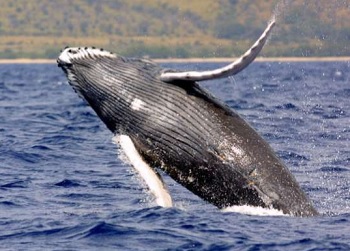
California crabbing rules a concern says North Coast fisherman
Local crab fisherman Mike Cunningham said he’s spoken with fishermen across the West Coast who take issue with the new rules. “We always look to avoid entanglements with whales,” Cunningham said. “The biggest problem (with the new rules) is that they are talking about closing massive areas to fishing. You could have an entanglement problem near Monterey, and the director (of Fish and Wildlife) could close the waters from Monterey up past Humboldt.” There are six fishing zones along the state’s coast. “The director now has the authority to do anything at any time,” Cunningham said. “Now, sometimes, it may just be a fleet advisory or warning, but it could go all the way to closing the entire coast to crab fishing.” The new rules stem from a lawsuit filed against the state by the Center for Biological Diversity, settled in 2019, >click to read< 19:48

Boasberg sets deadline for new North Atlantic Right Whale Protections no later than May 31, 2021
The Center for Biological Diversity, Conservation Law Foundation, Defenders of Wildlife and the Humane Society of the United States sued the federal government for violating the Endangered Species Act by allowing the lobster fishery to operate in a manner known to entangle right whales. U.S. District Court Judge James E. Boasberg also ordered a new ESA-mandated analysis of the American lobster fishery that takes into account the full scope of its harm to right whales. He stopped short of prohibiting lobster fishing with vertical buoy lines in a key right whale feeding area, which the groups had requested as an interim measure. >click to read< 07:15
Judge: Lobstering can proceed until new right whale protections are finalized in May – The right whale protection lawsuit winding its way through the federal courts for two years has often been called the “wild card” in the battle between environmental groups trying to save the critically endangered whale from extinction and Maine lobstermen trying to protect their way of life. >click to read< 17:24
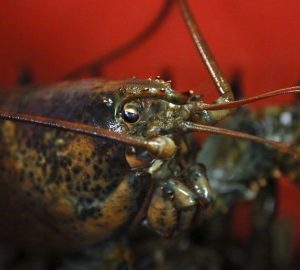
North Atlantic Right Whale: Maine Certified Sustainable Lobster Association loses MSC certification despite sustainable management of the Maine lobster fishery
The Maine Certified Sustainable Lobster Association (MCSLA) announced today that its Marine Stewardship Council (MSC) certification will be suspended due to a recent decision in the federal case Center for Biological Diversity v. Ross. The certificate suspension is occurring despite continued sustainable management of the Maine lobster fishery and remains the direct result of NOAA’s 2014 biological opinion on the impact that lobster fishing has on right whales. The MCSLA is anticipating NOAA’s 2020 draft biological opinion, which may be made public as soon as August 2020. Once the 2020 biological opinion is finalized and implemented, the MCSLA will work to quickly regain its MSC certification. >click to read< 11:45
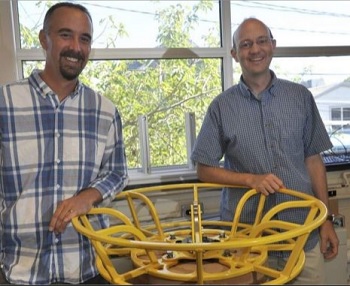
Con groups propose total lobster fishing ban
According to the Center for Biological Diversity and several other plaintiff conservation groups, the area “has increasingly become important right whale foraging and socializing habitat in recent years.” The conservation groups filed their request last Friday, three weeks after the judge ruled that the National Marine Fisheries Service (NMFS) violated the federal Endangered Species Act when it continued to allow lobster fishing with gear that used fixed vertical buoy lines in which whales could become entangled. As a practical matter, a ban on the vertical lines that connect traps on the sea floor to marker buoys on the surface would amount to a total prohibition against lobster fishing in the area south of the two Massachusetts islands. While scientists at the Woods Hole Oceanographic Institution and a few others have experimented with “ropeless” lobster trap gear (laughter and scorn, erupts from the crowd),,, >click to read< 09:18

Court Finds American Lobster Fishery Requires Incidental Take Statement for Impacts on North Atlantic Right Whale
As commercial fisheries across the United States continue to adjust operations in the face of new legal requirements, such as the shift from single-species to ecosystem-based management, one challenge in particular has dominated the courts: the Endangered Species Act (ESA). Recent court decisions have vacated commercial longline fishing permits in federal waters off the coast of California that could endanger the Pacific leatherback sea turtle and restored prohibitions on gillnet fishing gear in a known New England feeding ground for the endangered North Atlantic right whale. This trend continued on April 9, when a federal district court judge in Center for Biological Diversity,,,The American lobster fishery is managed cooperatively by the Atlantic States Marine Fisheries Commission and NMFS, >click to read< 14:45
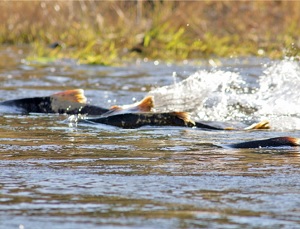
West Coast salmon season taking shape – Feds Look at Protections for Oregon Spring-Run Chinook Salmon
The Pacific Fishery Management Council has adopted ocean salmon season recommendations that provide recreational and commercial opportunities for most of the Pacific coast and achieve conservation goals for the numerous individual salmon stocks on the West Coast. >click to read< 17:25
Feds Look at Protections for Oregon Spring-Run Chinook Salmon -A petition seeking to extend federal wildlife protections to spring-run Chinook salmon found along Oregon’s coast has merit and could warrant listing the fish under the Endangered Species Act, Conservation groups Native Fish Society, the Center for Biological Diversity, and Umpqua Watersheds submitted a new petition in September 2019 specifically for spring-run salmon. >click you< 17:33
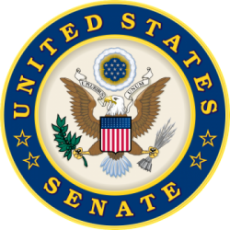
Senate Democrats, Greens Seek Climate Mandates In Federal Stimulus Bills
Senate Democrats and environmentalists want to tack climate change mandates onto proposed federal aid to major airlines and cruise lines reeling from the coronavirus pandemic. In a letter to the House and Senate leadership, eight Senate Democrats said last week that any financial assistance to the travel industry “should be paired with requirements that companies act in a more responsible fashion” by reducing their carbon footprint. “Climate change damages will wreak havoc on a scale even greater than the coronavirus,” said the Friday letter headed by the Center for Biological Diversity. Democrats who signed the letter were Sens. Sheldon Whitehouse of Rhode Island, Martin Heinrich of New Mexico, Jeffrey Merkley of Oregon, Cory A. Booker of New Jersey, Edward Markey of Massachusetts, Richard Blumenthal of Connecticut, Tina Smith of Minnesota and Debbie Stabenow of Michigan. >click to read< 10:12
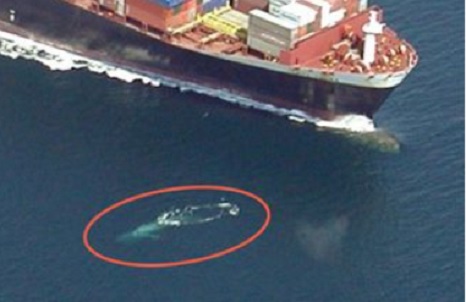
Enviro group says it may sue NMFS and Coast Guard to prevent whale deaths from ship strikes
The Center for Biological Diversity, which has an office in Los Angeles, alleges that the government agencies are ignoring the requirements of the Endangered Species Act in agency consultations, studies and actions such as speed limits in shipping lanes or protecting critical habitat areas. Ship strikes are a leading cause of death and injuries to whales migrating along California’s coast and are more lethal than previously understood >click to read< 16:22

Court: Trump Administration Unlawfully OK’d Longline Fishing Off California
The ruling released late Friday responds to a lawsuit filed by the Center for Biological Diversity and Turtle Island Restoration Network after the fishing permit issued in April exempted vessels from the federal ban on longline gear off California. Longlines stretch up to 60 miles, with thousand of baited hooks intended to catch swordfish and tuna. >click to read< 07:52

Dungeness crab fishing season delayed due to whale and sea turtle entanglement risk
Charlton Bonham, director of the Fish and Wildlife department, issued a decision to postpone the start date for California Dungeness crab fishermen south of the Mendocino/Sonoma County line for one week — from Nov. 15 to Nov. 22. The decision was based on data indicating the prevalence of whales in the area. Bonham’s decision to minimize entanglement risk follows a court-approved agreement with the Center for Biological Diversity, a Phoenix-based environmental nonprofit that in 2017 sued the wildlife agency,,, >click to read< 16:52






